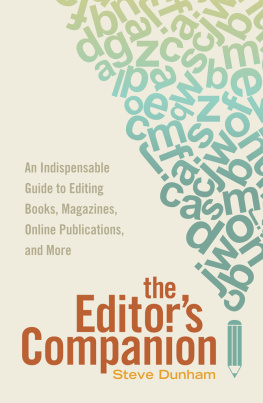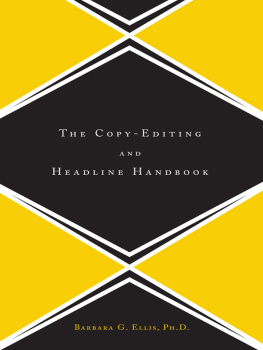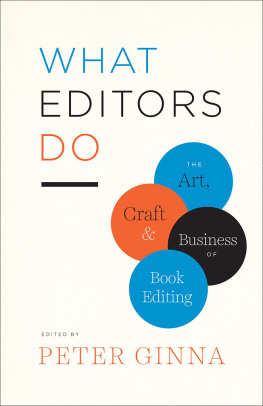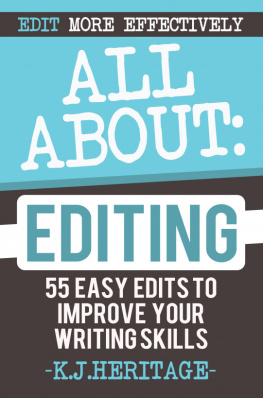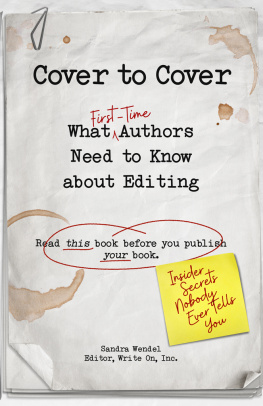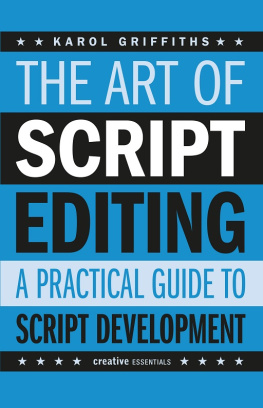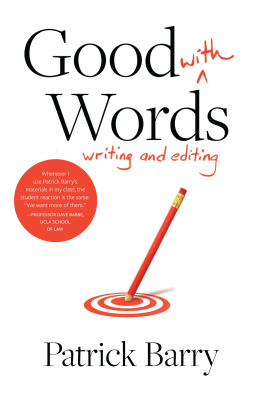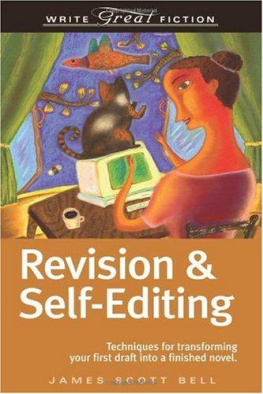Contents
Guide
An Indispensable
Guide to Editing
Books, Magazines,
Online Publications,
and More
the Editors Companion
Steve Dunham

Cincinnati, Ohio
DEDICATION
To all the people who know so much more than I do but have patiently helped me learn: thank you!
Contents
Preface
Editingwho needs it?
As a writer, I need it. I make mistakes. I write things that I think will be clear to everybody, but an editor says, No, no, Steve, and I realize my error. Thank God for editors. Nobody loves a copy editor, but everybody needs one, wrote copy editor Laura Moyer,
Editors, writers, everyonewe all make mistakes, no matter how educated we are.
Many general graduates, though computer-literate, cannot edit their own rsums, wrote Arthur Plotnik in 1982. Its still true thirty years later. (I saw one rsum on which a man claimed to have been an adverse weather aerial delivery system. I still have no idea what he was talking about.)
One writer produced an article for an online company publication and didnt think it needed editing, so it got posted as written. A spell-check would have caught the typoscon-sensus; thethreat; fo; for,and; con cluded; disaf-fected; and dieon,but the published article also misquoted a federal law and a federal report, and it cited a symposium that took place 28-18 November 2000. It took an editor to notice that the date was bogus.
If only the U.S. Special Operations Command had gotten an editor involved before circulating a want ad for technical writters for operational rediness documents.
Editors dont just catch typos, though. We are also responsible for the meaning of the words. The Bureau of Alcohol, Tobacco and Firearms reference to its unique expertise in the use and misuse of firearms and explosives would have benefited from some editing. (I myself have some expertise in the misuse of explosives: On one Fourth of July, I set our yard on fire while shooting off fireworks.)
Theres a lot more that editors doArthur Plotnik enumerated six skills: research, strategy, perception, organization, language, and troubleshooting.
This is how I would summarize it: As editors, our task is to assist the writer in the job of communication. Communication might take the form of persuading, informing, convincing, entertaining, or inspiring. Assisting the writer might mean rejecting the work if it is being presented to the wrong audience (by submitting it to the wrong publisher) or if it is unsuitable for publication because the writer has not done a proper job.
This aspect of editingselecting material for publicationis as much an art as a science. It requires taste, sensitivity to the readers needs and desires, a feel for what is good writing, and a sense of which new and untried material will appeal to readers. Even if you are new to editing, you may find yourself responsible for choosing what gets published, although in some organizations an editor may have no say in those decisions.
Some other aspects of editing are, if not more science than art, at least governed more completely by rules and standards. By standards, I mean Standard English: the English that with respect to spelling, grammar, pronunciation, and vocabulary is substantially uniform though not devoid of regional differences, that is well established by usage in the formal and informal speech and writing of the educated, and that is widely recognized as acceptable wherever English is spoken and understood, according to Merriam-Websters Collegiate Dictionary.
Nonetheless, something may be grammatically perfect rule-wise yet fail the fundamental test of good grammar, which is crystal-clear communication, wrote Rich Adin on his blog, An American Editor.
Editing means not only applying the rules, but also applying good judgment. Baltimore Sun copy editor John McIntyre offers this advice: If you spend all your time chasing shibboleths and tweaking minor solecisms, you may not take into account that the text itself is vapid and inane. This book is not a substitute for good judgment nor for a style guide, such as The Associated Press Stylebook and Libel Manual, nor for a classic work on writing, such as The Elements of Style. I could not hope to improve on them or to cover grammar and word usage in such detail or with such authority and accuracy. You will want these and other comprehensive guides on hand to study and reference.
Rather I want to present an approach to editing that answers the questions What do I need to do? How do I do that? and Why do I do that? and helps editors make good judgments.
Not all editors agree on everything, and in some places Ive presented more than one viewpoint. Listening to different thoughtful voices is helpful in thinking about writing and editing, and in making our own choices.
I hope that this book will help you learn to apply the rules and standards of written English to others writing and help writers to better communicate.
Introduction
Do not be satisfied if you write so that someone can decipher it. Tell your story so that anyone with the right background can understand and even enjoy it.
Matt Young, The Technical Writers Handbook
Most of us editors, I think, are editors because we love English. Through study and work, weve learned what makes writing good, and weve learned how to bridge the gap between ordinary writing and good writing. We do that by taking writing that has potential and bringing it up to our standards.
Yes, we have standards. The standards exist because theyre proven. Writers who follow the rules will, on the whole, do a better job of communicating than those who do not. Language is arbitrary, but its not anarchic, wrote the late Richard Mitchell, English professor and the Underground Grammarian.
There are exceptions. You might arrive at a destination faster by disregarding the traffic laws, but you are more likely to get there every time if you follow the rules. Writing is like that. You can break the rules and still get where youre going, but if you repeatedly disregard the rules, youre more likely to cause a wreck along the way.
In writing there are (perhaps unfortunately) no fines for breaking the rules. You wont lose your literary license for committing too many infractions. The only penalty is failure: failure to get your work published, failure to communicate, failure to do the best you can. As writers or editors, we have our share of failures, but with careful effort we can enjoy success: getting our work published, communicating with our readers, and doing the best we can.
Not everyone appreciates the value of our efforts. There are fewer individuals who can recognize good editing from bad [or] no editing, and even fewer who care, being more concerned with cost, wrote Rich Adin on his blog, An American Editor.
Is there a war on editing? The demand for traditional editing skills is going away, argued Rufus Griscom of Babble, a parenting website. Abundance is necessary to win online, and it is impossible to produce abundance with intensive editorial process. So Griscom acknowledged the rules, although not the need to correct errors before publication.
Cant you just fix errors later, after readers notice them? asks The Yahoo! Style Guide.

